What Aromatherapy Oils Are Safe for Cats
Curious about using aromatherapy candles safe for cats but unsure about their safety?
This article will guide you through the world of aromatherapy for cats, exploring the differences between essential oils and carrier oils, as well as the potential dangers of using these oils with your pet.
Find out which aromatherapy oils are safe for cats, how to use them properly, and why consulting with a vet is crucial to ensure your cat’s well-being while enjoying the benefits of aromatherapy.
Key Takeaways:
What is Aromatherapy?
Aromatherapy is a holistic healing treatment that uses natural plant extracts, known as essential oils, to promote physical, emotional, and mental health in both humans and animals, including cats.
Historically, the use of essential oils dates back to ancient civilizations like the Egyptians, Greeks, and Romans who embraced the therapeutic properties of aromatic plants. The core principle of aromatherapy revolves around the idea that inhaling these natural scents can stimulate brain functions, influencing emotions and physical responses.
- Essential oils extracted from plants carry potent aromatic compounds that offer various health benefits when used cautiously.
- In terms of feline well-being, essential oils like lavender, chamomile, and cedarwood can aid in reducing anxiety, alleviating skin irritations, and even supporting immune system functions.
What are Aromatherapy Oils?
Aromatherapy oils are natural plant-derived substances, specifically essential oils, that are used in aromatherapy practices to provide various therapeutic benefits for individuals, including cats.
Essential oils are highly concentrated extracts obtained through methods like distillation or cold pressing, capturing the volatile aromatic compounds of plants. These oils are known for their potent fragrance and therapeutic properties, ranging from calming effects to immune system support. Learn more about whether diffusing essential oils is safe for cats.
On the other hand, carrier oils, such as coconut oil or olive oil, are used to dilute essential oils for safe application on the skin or fur of felines. Carrier oils do not contain the same intensity of aromatic compounds as essential oils but serve as a base for dilution.
What are Essential Oils?
Essential oils are highly concentrated plant extracts obtained from various botanical sources, possessing potent therapeutic properties that can positively impact the health and well-being of cats when used correctly.
In terms of extracting essential oils, there are different methods employed, such as steam distillation, cold pressing, or solvent extraction, each suitable for extracting oils from specific plant parts. Cats can benefit from the calming effects of lavender oil, which can help reduce stress and anxiety. However, it’s crucial to avoid certain oils like tea tree, clove, and citrus oils, as they can be toxic to cats if ingested or applied directly to their skin.
What are Carrier Oils?
Carrier oils are base oils used to dilute essential oils before applying them to cats, ensuring safe and effective delivery of the concentrated essential oil properties while minimizing the risk of adverse reactions.
In the world of feline aromatherapy, carrier oils act as the unsung heroes, not just diluting but also providing their own set of benefits. Common carrier oils like sweet almond, coconut, jojoba, and olive oil are popular choices for their nourishing qualities and gentle nature on feline skin.
Proper dilution is key in ensuring that the essential oils are correctly absorbed by your furry friend without causing any harm. Failure to dilute can lead to skin sensitivities, allergies, or other undesirable reactions.
Is Aromatherapy Safe for Cats?
While aromatherapy can offer various benefits for cats, it is essential to approach it with caution and ensure that the oils and methods used are safe and suitable for feline companions.
When considering aromatherapy for cats, it is crucial to recognize that felines have unique sensitivities to certain essential oils, which can pose potential risks if not handled properly. Cats lack certain liver enzymes that are essential for metabolizing specific compounds found in essential oils, making them more susceptible to toxicity and adverse effects.
Responsible usage of aromatherapy for cats involves consulting with a qualified veterinarian who is knowledgeable about feline health and the effects of essential oils on cats. It is important to avoid using oils that are known to be toxic to cats, such as tea tree oil, clove oil, and citrus oils.
What Makes Aromatherapy Unsafe for Cats?
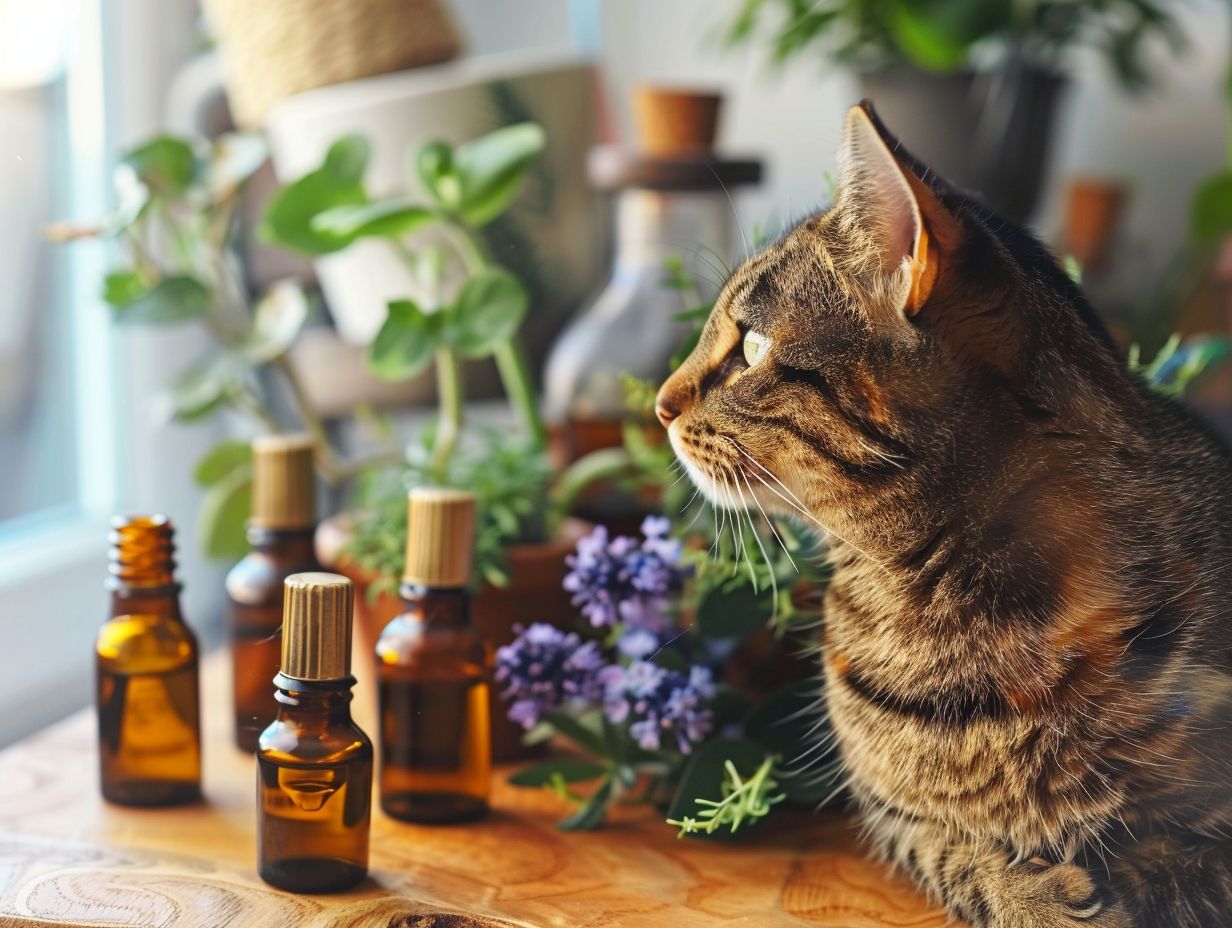
It is crucial for cat owners to be aware that not all essential oils are safe for their feline friends. Substances like tea tree oil, citrus oils, pine, peppermint, and lavender can be toxic to cats when inhaled, ingested, or in direct contact with their skin.
Cats have a unique sensitivity to certain compounds present in essential oils, which can disrupt their liver function and respiratory system. The incorrect application methods, such as diffusers with strong scents or direct topical application, can overwhelm a cat’s delicate senses and lead to distress.
What are the Dangers of Aromatherapy for Cats?
The dangers of aromatherapy for cats primarily revolve around the toxicity of certain essential oils, skin sensitivities, respiratory issues, and ingestion risks that can pose serious health threats to feline companions if not handled carefully.
Essential oils such as tea tree, peppermint, citrus, and eucalyptus are known to be particularly harmful to cats due to their compounds that can cause liver damage, nervous system issues, or even central nervous system depression when inhaled or ingested. Cats lacking the necessary enzymes to metabolize these oils properly are at higher risk.
Direct skin contact with undiluted essential oils can lead to irritations, burns, or allergic reactions, causing discomfort and potentially triggering more severe health complications. To ensure the safety of your feline friend, it is important to know is vanilla essential oils safe for cats.
It’s important to consult with a veterinarian before introducing any form of aromatherapy to your feline friend to ensure their safety and well-being.
What Aromatherapy Oils are Safe for Cats?
Certain aromatherapy oils have been deemed safe for cats when used appropriately, such as lavender oil, chamomile oil, frankincense oil, cedarwood oil, spearmint oil, and valerian oil, offering potential benefits without significant risks.
When considering the use of lavender oil for your feline friend, it’s important to note its calming properties, which can help reduce stress and anxiety, ideal for cats experiencing mood imbalances. Similarly, chamomile oil is known for its soothing effects, aiding in relaxation and promoting better sleep.
Is Eucalyptus Aromatherapy Safe for Cats oil is valued for its immune-boosting properties, supporting overall wellness in your cat. On the other hand, cedarwood oil can act as a natural insect repellent, making it a practical choice for outdoor or adventurous kitties.
Spearmint oil is often used to alleviate digestive issues in cats, thanks to its digestive benefits that may help with bloating or gastrointestinal discomfort. Valerian oil, known for its sedative effects, can assist in calming hyperactive or anxious cats.
Lavender Oil
Lavender oil is a popular choice for feline aromatherapy due to its calming and relaxing properties, making it suitable for reducing stress and anxiety in cats when properly diluted and used sparingly.
When used in aromatherapy, lavender oil can help create a serene environment for your furry friend, alleviating nervousness and promoting a sense of well-being. Not only does it have a pleasant scent, but lavender oil also possesses natural antibacterial and antifungal properties, aiding in maintaining your cat’s hygiene. To ensure safe application, it is important to dilute the oil appropriately, typically by mixing a small amount with a carrier oil or water. The recommended dosage varies depending on the size and age of the cat, so consulting with a veterinarian is advisable for the best results.
Chamomile Oil
Chamomile oil, whether Roman or German chamomile, is known for its calming and anti-inflammatory properties, making it a safe and gentle option for promoting relaxation and soothing minor skin irritations in cats.
When using chamomile oil in aromatherapy for cats, it can help alleviate stress and anxiety, creating a calming atmosphere that can benefit both the feline and its owner. The soothing scent of chamomile is often used in diffusers or added to homemade cat-friendly sprays. This versatile oil can also assist in reducing inflammation in cats, providing relief from conditions such as arthritis or digestive issues.
Frankincense Oil
Frankincense oil is valued for its potential to enhance mental clarity, reduce stress, and support overall well-being in cats, offering a safe and gentle option for aromatherapy practices when used appropriately.
When frankincense oil is diffused in the air, its calming and grounding properties can help cats relax and create a soothing environment, which can be especially beneficial during stressful situations or when introducing new elements to their surroundings. The soothing aroma of frankincense oil may also aid in reducing anxiety, fear, and aggression in cats, promoting a sense of security and comfort.
Cedarwood Oil
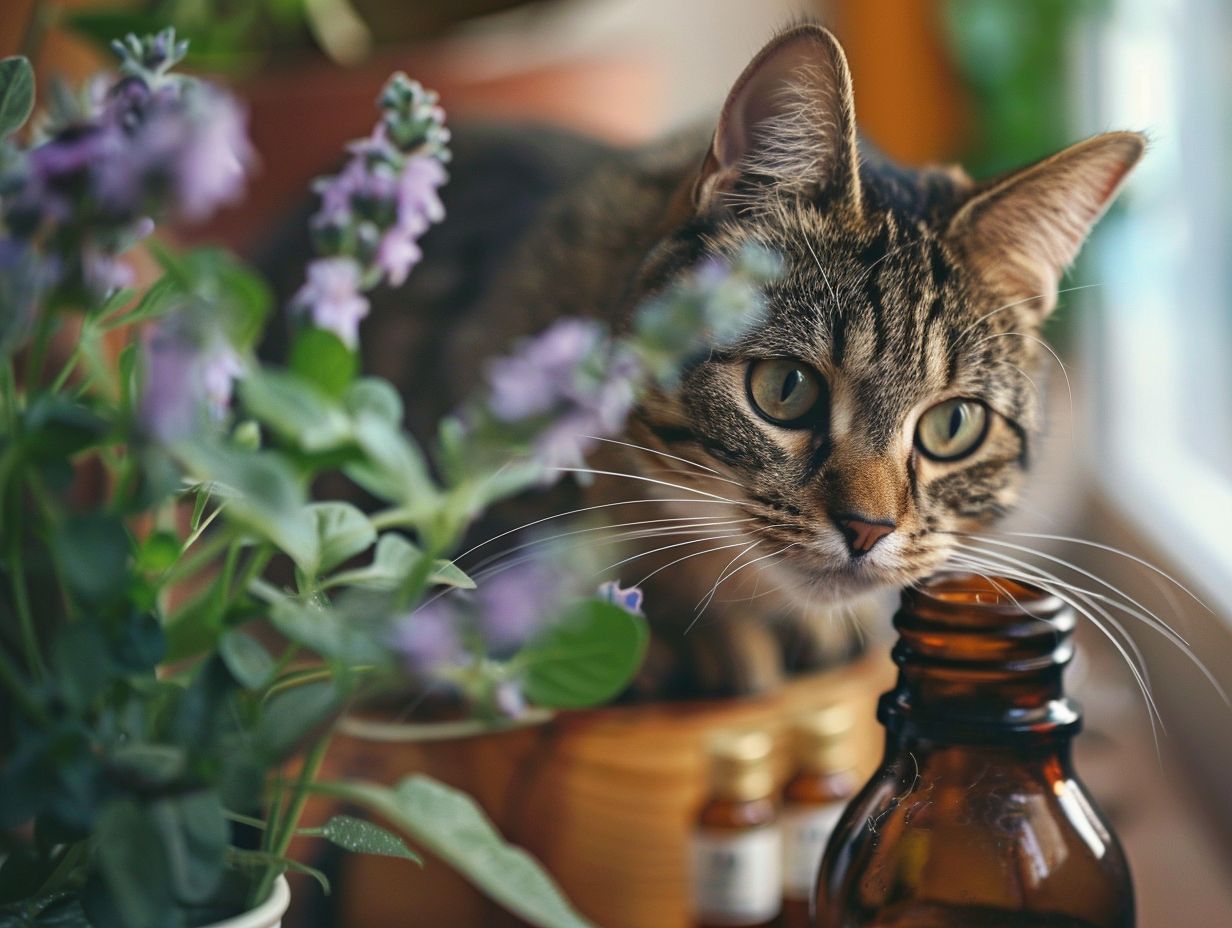
Cedarwood essential oil is a natural remedy that can be a great addition to your feline care routine. Not only does it help in keeping pesky insects at bay, but it also aids in reducing stress and anxiety in cats. By diffusing cedarwood oil in your home, you can create a peaceful atmosphere that your furry friend will appreciate.
When used in conjunction with other cat-friendly essential oils like lavender or chamomile, cedarwood oil can enhance the overall calming effect, making it a versatile option for various aromatherapy blends. Remember to always dilute the oil properly before using it on your cat and consult with a veterinarian for suitable application methods.
Spearmint Oil
Spearmint oil offers a refreshing and energizing aroma that can help uplift cats’ moods and invigorate their senses, providing a stimulating and pleasant experience when used in feline aromatherapy practices.
The antimicrobial properties of spearmint oil can aid in keeping your feline friend’s environment clean and fresh. This essential oil is also known for its natural insect repellent qualities, which can help protect your cat from pesky bugs. When diffused or applied topically with proper dilution, spearmint oil can create a calming atmosphere that promotes relaxation and tranquility for your cat. Ensuring that you use a high-quality, pure spearmint oil is crucial for the safety and well-being of your furry companion.
Valerian Oil
Valerian oil is known for its sedative and calming properties, making it a suitable choice for managing anxiety, promoting relaxation, and supporting restful sleep in cats when administered in controlled amounts.
One of the benefits of valerian oil is its ability to help soothe cats who are experiencing stress due to environmental changes, loud noises, or separation anxiety. When inhaled or applied topically, this essential oil can create a sense of calm and ease tension in cats’ nervous systems.
It is important to note that valerian oil should be diluted before use, as it can be potent in its pure form. Mixing a few drops with a carrier oil such as coconut or olive oil can help ensure safe application and reduce the risk of any adverse reactions.
How to Use Aromatherapy Oils Safely for Cats?
To ensure the safe and effective use of aromatherapy oils for cats, it is crucial to dilute essential oils properly, use a diffuser for controlled dispersion, avoid direct skin contact, and always seek guidance from a qualified veterinarian.
When diluting essential oils for feline use, remember that cats are incredibly sensitive to strong scents, so a general rule of thumb is to use one drop of essential oil per ounce of carrier oil.
In terms of diffusion, opt for a high-quality diffuser that releases oils in a controlled manner, keeping the concentration at a safe level for your cat’s well-being. Is lavender aromatherapy safe for cats?
Preventing direct exposure is paramount; ensure your cat does not ingest or inhale concentrated essential oils, as they can be harmful and even toxic. Learn more about peppermint aromatherapy for cats.
Consulting your veterinarian before introducing aromatherapy to your feline companion is essential to address any specific health concerns or potential sensitivities.
Dilute Essential Oils Properly
Properly diluting essential oils is essential to prevent skin irritation or toxicity in cats, with recommended dilution ratios varying based on the specific oil and the intended use for aromatherapy purposes.
In terms of feline aromatherapy, dilution plays a vital role in ensuring the safety and effectiveness of using essential oils. Cats are particularly sensitive to concentrated oils, partly due to their unique metabolism, so extra caution is warranted. Optimal dilution ratios typically range between 0.1% to 1%, depending on the specific oil. A good rule of thumb is to start with a lower concentration and gradually increase it as needed, carefully observing your feline’s reaction.
Use a Diffuser
Employing a diffuser for dispersing aromatherapy oils can help create a gentle and controlled environment for cats to experience the benefits of essential oils without overwhelming their senses or causing direct contact risks.
One advantage of using diffusers in feline aromatherapy is the efficient and safe way they disperse essential oils in the air, providing a subtle and continuous release of the therapeutic scents. This method ensures that the cats are exposed to just the right amount of aroma without being overwhelmed, making it a gentle approach suitable for their sensitive olfactory system.
Selecting the appropriate diffuser is crucial for effective feline aromatherapy. Opt for safe aromatherapy oils for dogs specifically designed for use with essential oils and ones that offer adjustable settings for controlling the diffusion intensity and duration.
When diffusing oils around cats, it is important to follow guidelines to ensure their safety and well-being. Keep the diffuser in a well-ventilated area, monitor your cat’s behavior for any signs of discomfort, and always use cat-friendly essential oils known to be safe for felines.
Avoid Direct Contact with Oils
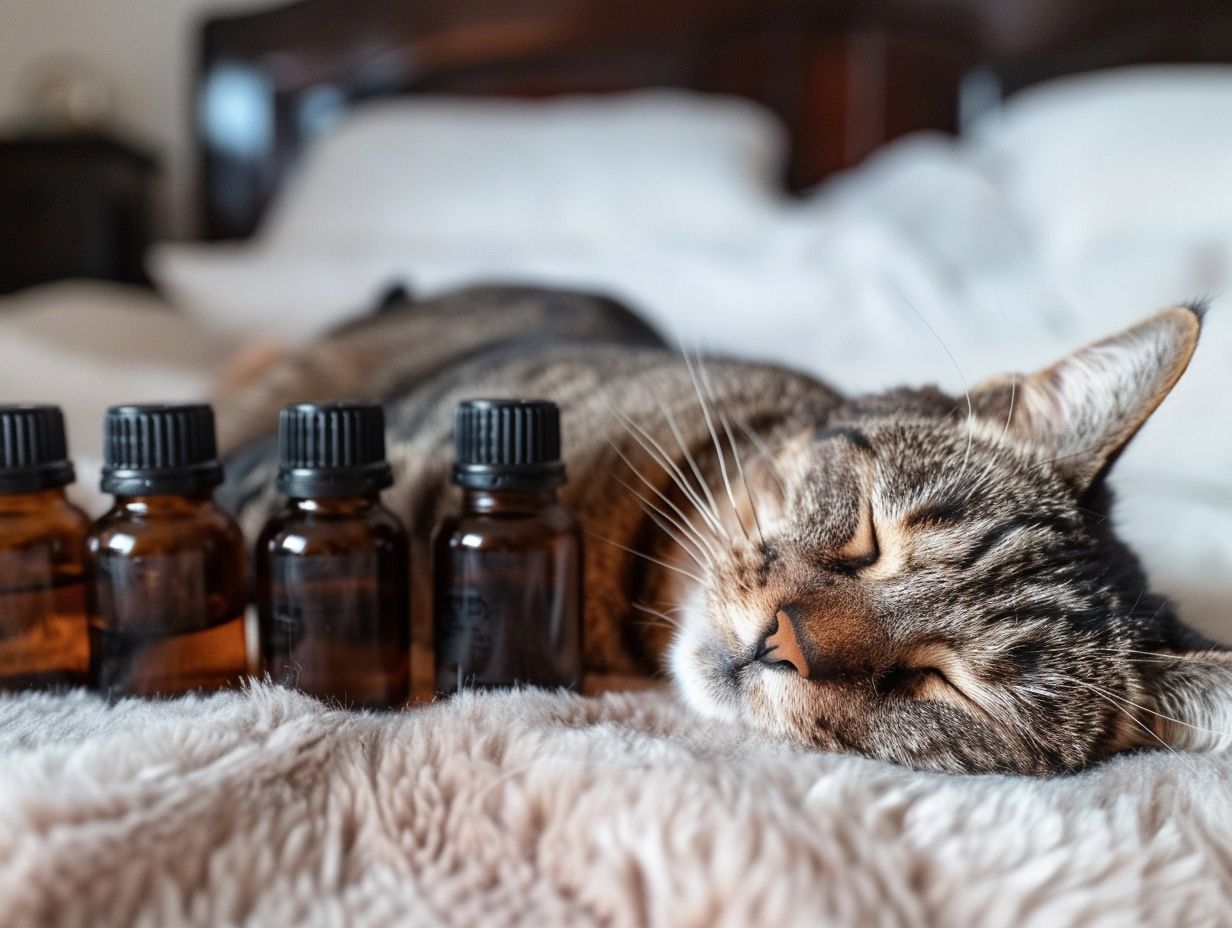
When dealing with essential oils around your feline friend, it’s essential to understand that their biology differs from humans. Cats lack certain enzymes to metabolize the compounds found in many essential oils, making them more vulnerable to toxicity. It is advisable to store essential oils out of reach, preferably in locked cabinets or high shelves, to prevent accidental spills or ingestion by curious pets. Always dilute essential oils in a carrier oil before use, following safe dilution ratios recommended for cats to mitigate potential harm.
Consult with a Vet
Seeking guidance and approval from a qualified veterinarian before using aromatherapy oils on cats is essential to ensure that the chosen oils are safe, appropriate for feline companions, and compatible with any existing health conditions or medications.
Professional consultation with a veterinary professional can help pet owners navigate the world of aromatherapy with confidence. Veterinarians play a crucial role in understanding a cat’s specific needs, such as allergies, sensitivities, or behavioral issues, and can recommend the most suitable essential oils for each individual cat.
Veterinarians can provide guidance on the proper dilution ratios, application methods, and potential side effects to watch for when using aromatherapy with feline patients. This personalized approach ensures cat owners can harness the benefits of aromatherapy while minimizing any risks.
Frequently Asked Questions
What Aromatherapy Oils Are Safe for Cats?
There are a few essential oils that are generally considered safe for cats, including lavender, chamomile, and frankincense.
Can I Use Any Aromatherapy Oil on My Cat?
No, not all aromatherapy oils are safe for cats. Some oils can be toxic and even deadly to cats, so it’s important to do your research and only use oils that are approved for use on cats.
How Do I Know if an Aromatherapy Oil is Safe for Cats?
One way to determine if an aromatherapy oil is safe for cats is to check with a certified aromatherapist. They will be able to recommend oils that are safe and suitable for your cat’s specific needs.
What Should I Do if My Cat Has an Adverse Reaction to an Aromatherapy Oil?
If your cat experiences any adverse reactions after being exposed to an aromatherapy oil, such as vomiting, difficulty breathing, or skin irritation, it’s important to seek immediate veterinary care.
Can I Use Aromatherapy Oils on Kittens?
Kittens are much more sensitive than adult cats, so it’s best to avoid using any aromatherapy oils on kittens. If you have concerns about your kitten’s health, consult with a veterinarian before using any oils.
Are There Any Precautions I Should Take When Using Aromatherapy Oils Around My Cat?
Yes, there are a few precautions to keep in mind when using aromatherapy oils around your cat. Always dilute oils properly, keep them out of reach, avoid using oils directly on your cat’s fur, and never force your cat to inhale the scent.

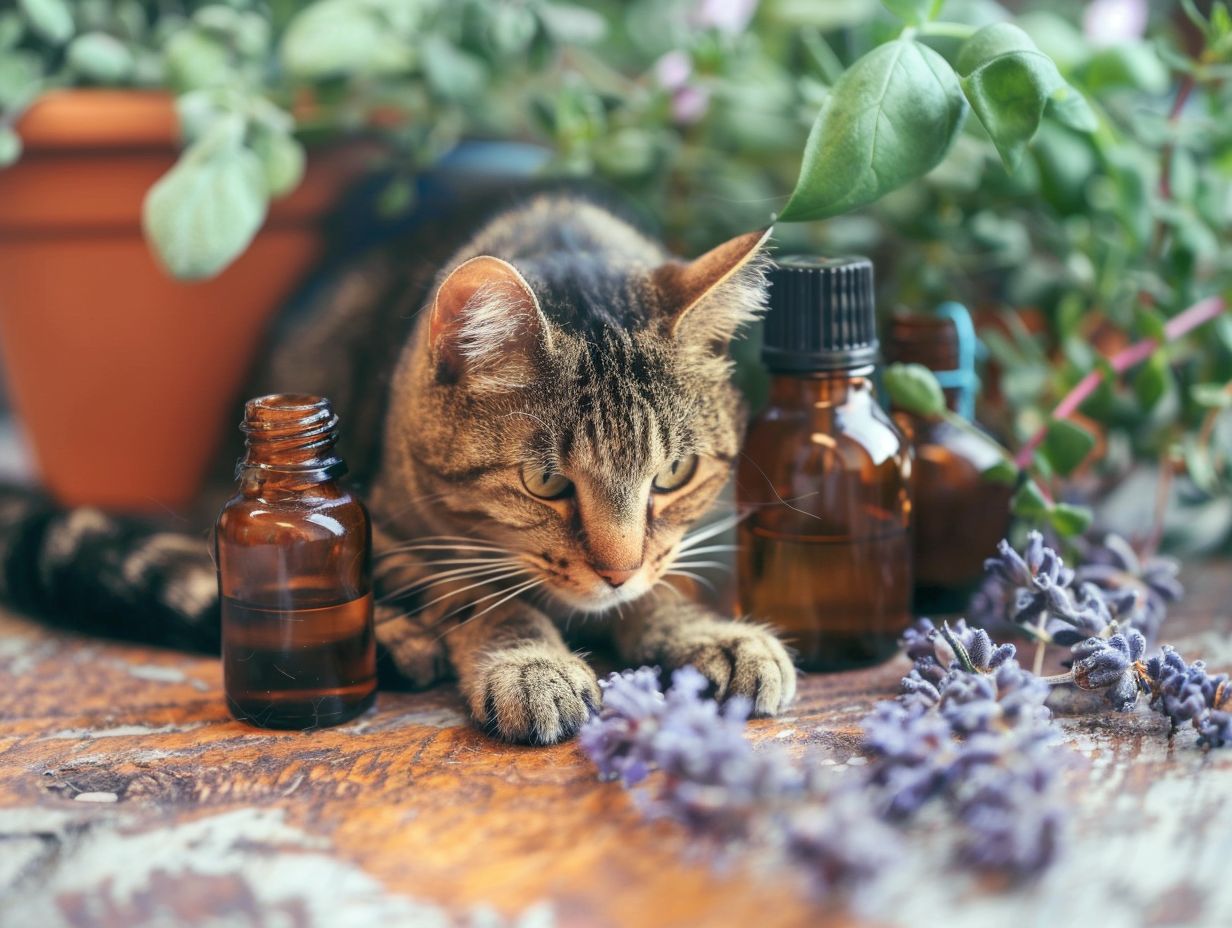
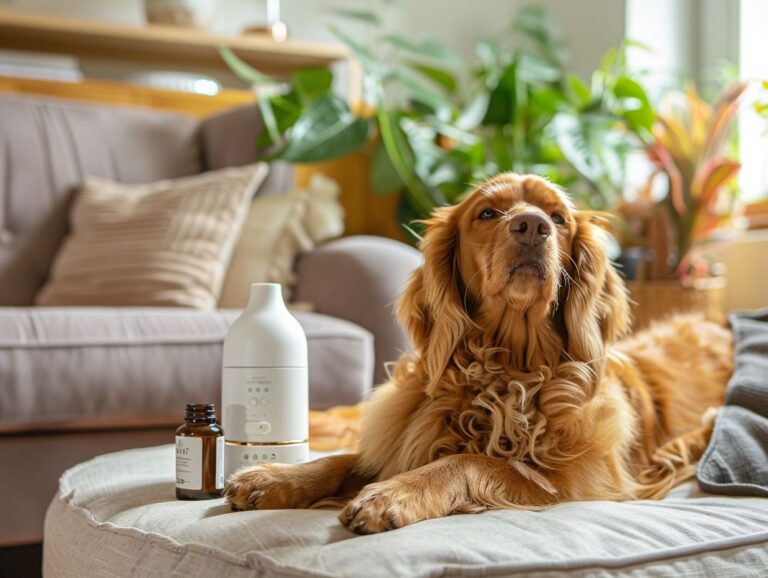
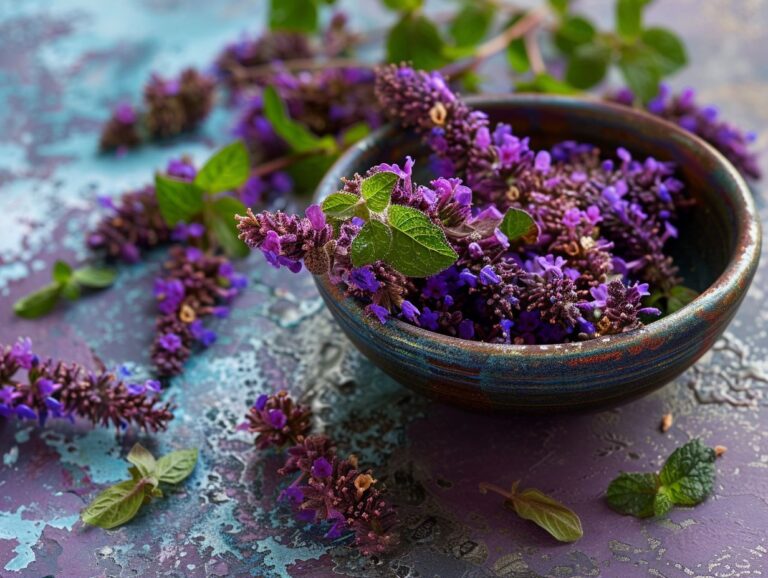
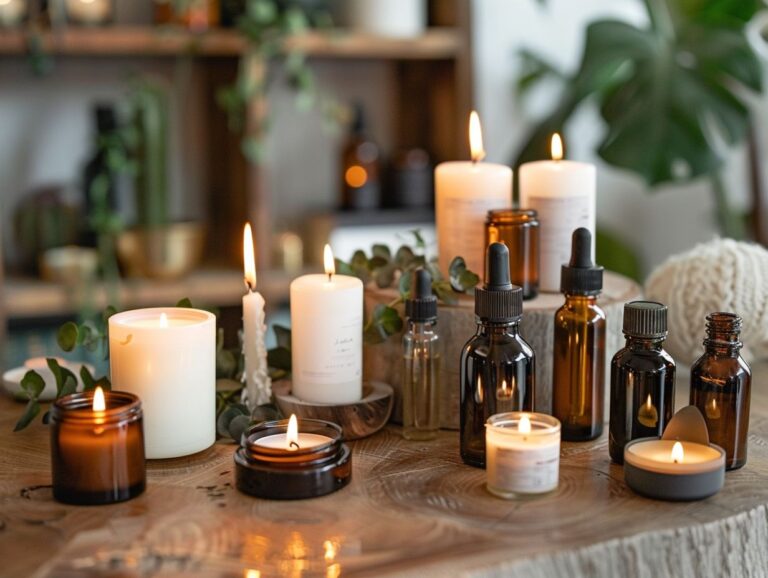

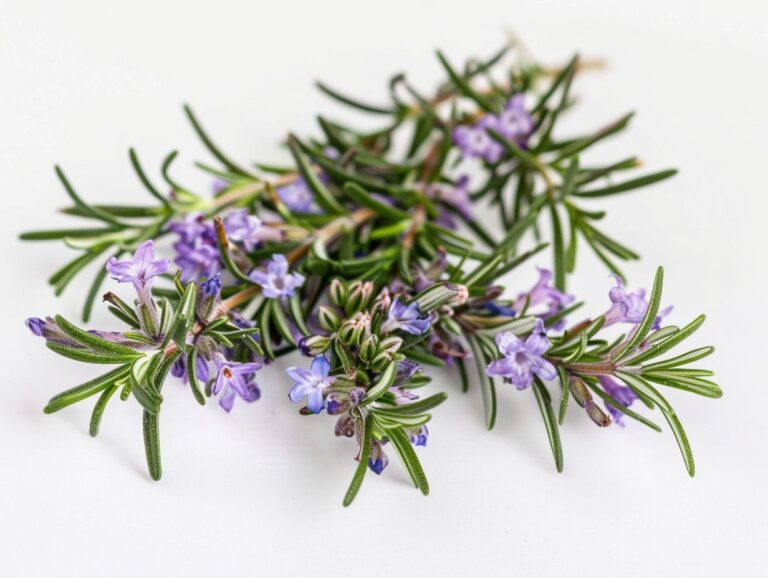
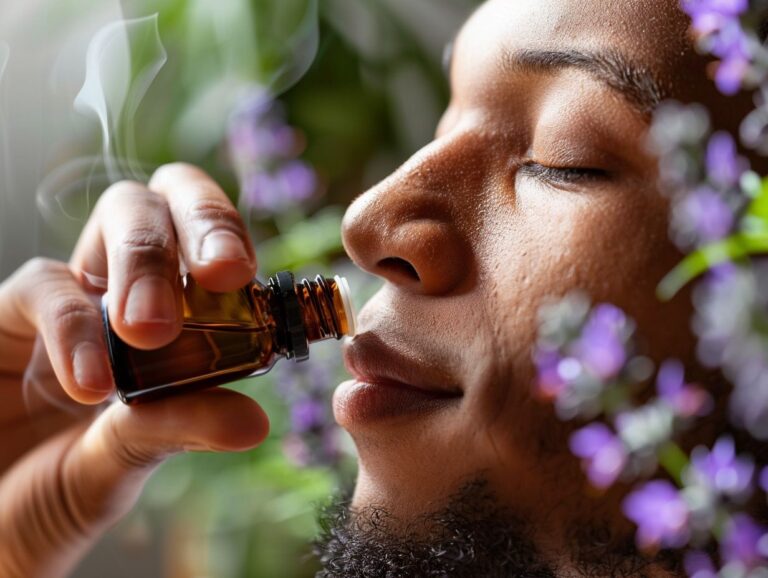
3 Comments